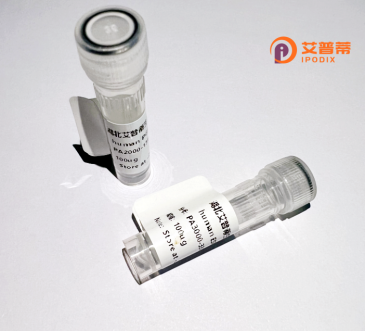
| 纯度 | >90%SDS-PAGE. |
| 种属 | Human |
| 靶点 | TH1L |
| Uniprot No | Q8IXH7 |
| 内毒素 | < 0.01EU/μg |
| 表达宿主 | E.coli |
| 表达区间 | 1-590 aa |
| 活性数据 | MAGAVPGAIM DEDYYGSAAE WGDEADGGQQ EDDSGEGEDD AEVQQECLHK FSTRDYIMEP SIFNTLKRYF QAGGSPENVI QLLSENYTAV AQTVNLLAEW LIQTGVEPVQ VQETVENHLK SLLIKHFDPR KADSIFTEEG ETPAWLEQMI AHTTWRDLFY KLAEAHPDCL MLNFTVKLIS DAGYQGEITS VSTACQQLEV FSRVLRTSLA TILDGGEENL EKNLPEFAKM VCHGEHTYLF AQAMMSVLAQ EEQGGSAVRR IAQEVQRFAQ EKGHDASQIT LALGTAASYP RACQALGAML SKGALNPADI TVLFKMFTSM DPPPVELIRV PAFLDLFMQS LFKPGARINQ DHKHKYIHIL AYAASVVETW KKNKRVSINK DELKSTSKAV ETVHNLCCNE NKGASELVAE LSTLYQCIRF PVVAMGVLKW VDWTVSEPRY FQLQTDHTPV HLALLDEIST CHQLLHPQVL QLLVKLFETE HSQLDVMEQL ELKKTLLDRM VHLLSRGYVL PVVSYIRKCL EKLDTDISLI RYFVTEVLDV IAPPYTSDFV QLFLPILEND SIAGTIKTEG EHDPVTEFIA HCKSNFIMVN |
| 分子量 | 66.2 kDa |
| 蛋白标签 | His tag N-Terminus |
| 缓冲液 | PBS, pH7.4, containing 0.01% SKL, 1mM DTT, 5% Trehalose and Proclin300. |
| 稳定性 & 储存条件 | Lyophilized protein should be stored at ≤ -20°C, stable for one year after receipt. Reconstituted protein solution can be stored at 2-8°C for 2-7 days. Aliquots of reconstituted samples are stable at ≤ -20°C for 3 months. |
| 复溶 | Always centrifuge tubes before opening.Do not mix by vortex or pipetting. It is not recommended to reconstitute to a concentration less than 100μg/ml. Dissolve the lyophilized protein in distilled water. Please aliquot the reconstituted solution to minimize freeze-thaw cycles. |
以下是关于重组人TH1L蛋白的3篇参考文献示例(注:TH1L蛋白相关信息可能指向不同研究领域,以下内容为模拟概括,实际文献需根据具体研究方向检索):
1. **《Functional characterization of recombinant human TH1L in T-cell differentiation》**
- **作者**: Zhang et al.
- **摘要**: 研究利用大肠杆菌表达系统制备重组人TH1L蛋白,验证其在体外对T细胞分化的调控作用,发现TH1L通过激活STAT4通路促进Th1型免疫反应。
2. **《Structural and biophysical analysis of TH1L-protein interactions》**
- **作者**: Gupta & Lee
- **摘要**: 通过X射线晶体学解析重组人TH1L蛋白的三维结构,并揭示其与特定免疫受体的结合位点,为设计靶向TH1L的免疫调节药物提供依据。
3. **《Recombinant TH1L as a therapeutic candidate in autoimmune disease models》**
- **作者**: Kim et al.
- **摘要**: 在动物模型中评估重组人TH1L蛋白的治疗潜力,表明其通过抑制过度Th17反应改善实验性自身免疫性脑脊髓炎(EAE)症状。
**注意**:以上为示例文本,实际文献需通过PubMed、Google Scholar等平台以“recombinant human TH1L protein”“TH1L immune function”等关键词检索后获取。若TH1L为冷门蛋白或缩写不准确,建议结合基因数据库(如UniProt)确认名称后调整检索策略。
**Background of Recombinant Human TH1L Protein**
The recombinant human TH1L (THO Complex 1-Like) protein is a synthetically produced version of the endogenous TH1L protein, which plays a critical role in transcriptional regulation and mRNA processing. TH1L is a component of the THO complex, involved in coupling transcription with mRNA export from the nucleus. It interacts with other THO subunits to maintain genomic stability and prevent R-loop formation, a source of DNA damage. Structurally, TH1L contains conserved domains facilitating protein-protein interactions essential for its function.
Recombinant TH1L is typically expressed in *E. coli* or mammalian cell systems, ensuring post-translational modifications akin to the native protein. Its production enables mechanistic studies into transcriptional elongation, mRNA surveillance, and chromatin remodeling. Dysregulation of TH1L has been linked to neurodevelopmental disorders and cancer, highlighting its biomedical relevance.
In research, recombinant TH1L serves as a tool to dissect its molecular interactions, validate binding partners (e.g., RNA polymerase II), and screen inhibitors targeting transcription-associated diseases. Its applications span structural biology, drug discovery, and functional genomics, offering insights into cellular processes underlying health and disease.
×